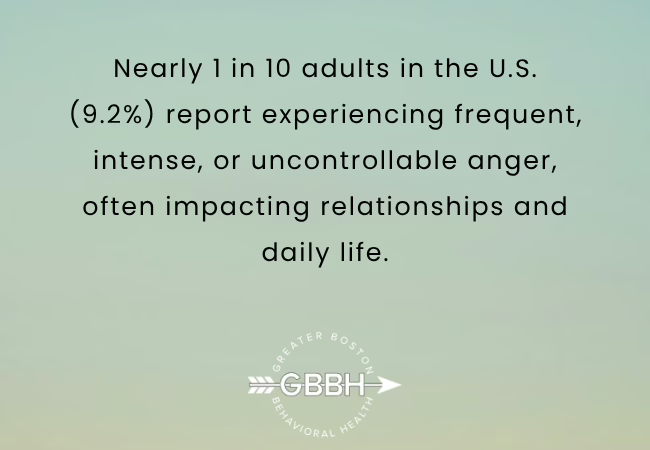Anger is a natural and often necessary human emotion. It can alert us to injustice, set healthy boundaries, and motivate change. But when anger becomes frequent, intense, or uncontrollable, it can lead to relationship damage, career setbacks, health issues, and even legal trouble.
At Greater Boston Behavioral Health, we help individuals recognize when their anger has crossed the line from manageable to harmful—and more importantly, how to take back control through evidence-based counseling.
Common Signs You May Need Anger Management Counseling
Here are some key indicators that anger management therapy could benefit your life:
1. You Feel Angry More Often Than Not
If you regularly feel irritated, resentful, or close to snapping, it may indicate that your emotional baseline is skewed. Chronic anger can interfere with your ability to enjoy daily life or maintain emotional stability.
2. Small Incidents Trigger Intense Reactions
Do minor frustrations—like traffic, spilled coffee, or slow responses—send you into a rage? This disproportionate reaction may be a sign that underlying emotional regulation issues need to be addressed.
3. People Around You Are Afraid to Speak Up
When friends, family, or coworkers feel they have to “walk on eggshells” around you, it’s a sign your anger is negatively affecting your relationships. You might be unintentionally creating a hostile or unpredictable environment.
4. You’ve Lost Relationships or Opportunities Due to Your Temper
Anger can end relationships, cost jobs, and lead to isolation. If you’ve experienced these consequences, it may be time to explore anger management therapy as part of a broader mental health program in Massachusetts.
5. You Regret Things You Say or Do When You’re Angry
Frequent feelings of shame or regret after angry outbursts indicate that your reactions are impulsive or uncontrolled. Therapy helps you pause, reflect, and respond instead of react.
6. You’ve Been Told You Need Help Managing Your Anger
Sometimes, the clearest sign comes from others. If a loved one, boss, therapist, or even the legal system has suggested counseling, it’s worth listening—especially if it’s not the first time.
7. You Experience Physical Symptoms When Angry
Uncontrolled anger isn’t just emotional—it’s physical. Symptoms like:
- Rapid heartbeat
- Muscle tension
- Headaches
- High blood pressure
…can be warning signs of chronic stress due to unmanaged anger.
8. You Use Substances to Cope With Anger
If you turn to alcohol, drugs, or other compulsive behaviors to calm down, it may point to deeper issues that require structured support through programs like our Intensive Outpatient Program in Massachusetts.
The Hidden Costs of Unchecked Anger: What It’s Really Doing to Your Life
While the visible signs of anger—like yelling, arguments, or physical aggression—are obvious, the invisible toll anger takes on your well-being and quality of life often goes unnoticed until it becomes overwhelming.
Here’s what unmanaged anger may be silently impacting:
-
Your Career
Chronic anger can damage workplace relationships, cause performance issues, and even lead to job loss. You may struggle with authority, interrupt colleagues, or find it difficult to take constructive feedback. -
Your Physical Health
Unregulated anger is linked to high blood pressure, increased risk of heart disease, insomnia, and chronic headaches. Over time, your body pays the price for unresolved emotional tension. -
Your Emotional Well-Being
Holding on to anger can lead to anxiety, guilt, shame, or depression. You may feel emotionally exhausted, isolated, or out of control—unable to find peace within yourself. -
Your Self-Perception
Many people struggling with anger feel ashamed of their behavior. Over time, this can lead to a deep sense of failure or hopelessness. Therapy helps you break that cycle and rebuild your confidence.
How Anger Management Counseling Works
At Greater Boston Behavioral Health, our anger management therapy programs in Massachusetts help you:
- Understand the roots of your anger
- Identify triggers and warning signs
- Learn healthy coping strategies (breathing, journaling, timeouts)
- Practice assertive (not aggressive) communication
- Repair relationships and improve emotional intelligence
These therapies are offered through Partial Hospitalization Programs (PHPs), IOPs, or integrated into inpatient treatment programs when anger is tied to substance use or mental health conditions.
When Anger Is Linked to Mental Health Conditions
Anger can be a symptom of:
- Depression
- Anxiety disorders
- PTSD or unresolved trauma
- Bipolar disorder
- Personality disorders
Our mental therapy programs in Massachusetts focus on addressing both the behavioral symptoms (like outbursts) and the underlying psychological causes, using a trauma-informed, compassionate approach.
Our Levels of Care for Anger Management
Depending on the severity of your symptoms, we may recommend:
Partial Hospitalization Program (PHP):
A structured day program with intensive group and individual therapy—ideal for those needing daily support without full-time inpatient care.
Intensive Outpatient Program (IOP):
Flexible scheduling for therapy several days a week—great for those balancing treatment with work or family life.
Inpatient/Residential Treatment:
For individuals whose anger stems from trauma, addiction, or complex co-occurring disorders needing full-time care.
Each level includes personalized anger management strategies and access to a wide array of mental health services.
Realistic Goals of Anger Management Counseling
You’re not expected to never feel angry again. Instead, therapy helps you:
- Recognize anger early
- Respond with intention, not impulse
- Rebuild trust and connection
- Set healthy boundaries
- Improve self-awareness and emotional regulation
It’s about gaining tools that empower—not suppress—your emotional life.
Conclusion
Uncontrolled anger doesn’t just affect your mood—it affects your relationships, your career, your health, and your sense of self. But the good news is this: anger is manageable, and change is absolutely possible. Recognizing the signs is the first step—and seeking help is the most powerful one.
At Greater Boston Behavioral Health, we offer more than therapy—we offer a path toward emotional freedom. Whether you need structured support through our Partial Hospitalization Program in Massachusetts, flexibility through our Intensive Outpatient Program, or compassionate counseling tailored to your needs, our team is here to walk beside you every step of the way. Call us today at 888.278.0716 to learn how our anger management therapy and mental health programs in Massachusetts can help you reclaim control, restore peace, and rebuild your life—starting now.
FAQ on Anger Management Counseling
What are the signs that I need anger management therapy?
Frequent irritability, relationship conflicts, physical outbursts, and feelings of regret or shame after getting angry are all signs that you may benefit from therapy.
Is anger always a sign of a deeper mental health issue?
Not always—but it often coexists with conditions like depression, anxiety, PTSD, or substance use disorders. At our Mental Health Treatment Center in Massachusetts, we treat both anger and any underlying causes.
Can therapy really help control my anger long-term?
Yes. Anger management therapy teaches long-term strategies like emotional regulation, assertive communication, and mindfulness to help you respond more effectively to triggers.
What kind of programs are available for anger management?
We offer therapy through our Partial Hospitalization Program (PHP), Intensive Outpatient Program (IOP), and tailored Mental Health Programs in Massachusetts, depending on your needs and lifestyle.


